April 17, 2025 | 15:39 GMT +7
April 17, 2025 | 15:39 GMT +7
Hotline: 0913.378.918
April 17, 2025 | 15:39 GMT +7
Hotline: 0913.378.918
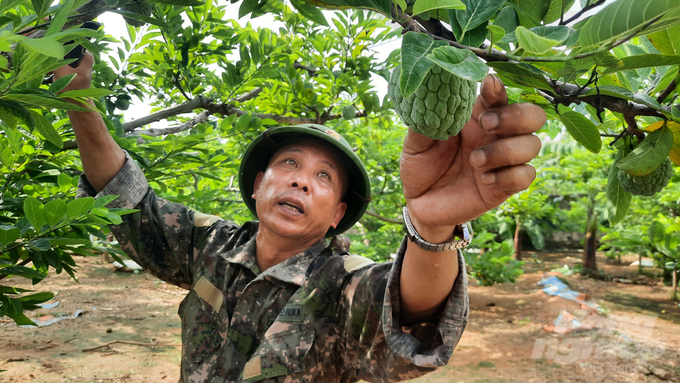
Using nanofertilizer helps the custard apple grow well. Photo: Nguyen Thanh.
The application of nanotechnology is being considered a new direction in the present time to develop efficient, safe and sustainable agriculture. In recent years, nanotechnology has also been applied effectively in Vietnam specifically the agricultural field, showing through pesticide production, seed treatment, veterinary drugs for livestock, aquaculture, and other environmental and water treatment products.
According to expert research, trace nanoparticles act as a biological stimulant. When there is an impact of a nano-sized trace element, the potential will be awakened and the plant will grow to a different level. When spraying the leaves with trace nanoparticles, the leaves absorb and the plant is supplemented with necessary nutrients, resulting in good growth and high yield.
The Department of Science and Technology of Quang Ninh province has recently cooperated with the National Institute of Agricultural Planning and Projection (Vietnam Union of Science and Technology Associations) and related units to carry out a research project on building models of using nanofertilizer in the production of rice, vegetables, and fruit trees in Quang Ninh province. This includes the custard apples in Dong Trieu town.
Dong Trieu currently has approximately 1,600 households growing custard apples with a total area of over 800 ha. The growing area is concentrated in the communes of Viet Dan, An Sinh, Tan Viet, Binh Khe, producing over 6,500 tons of fruit per year. The harvest time for the main crop is from the end of July to the middle of August. As for the additional crop, it is from the end of October to the end of November.
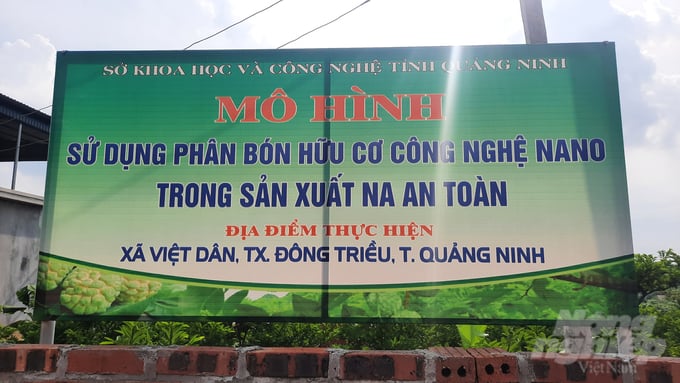
Viet Dan commune (Dong Trieu town, Quang Ninh province) has 7 ha of custard apples grown by applying nanotechnology. Photo: Nguyen Thanh.
Mr. Nguyen Van Khoa (Tan Thanh hamlet, Viet Dan commune, Dong Trieu town) said that his family currently had 0.5 ha of custard apples using nano preparations mixed water to irrigate. After 3 months of experiencing nanotechnology, the custard apple tree in the garden grows healthy, the leaves are darker compared to the area without using the mixture, limiting plant diseases such as mycorrhizal fungus, yellow leaf and harmful insects such as aphids, red spider mites, and thrips.
It can be said that the application of nanotechnology in agriculture opens a new path for farmers to meet the requirements of organic production, thereby creating high-quality agro-products, contributing to the socio-economic development of the locality towards clean agriculture, saving costs while increasing productivity and quality of crops.

Nanotechnology helps plants limit pests and diseases, giving high yield and quality fruits. Photo: Nguyen Thanh.
Dong Trieu town continues to implement mechanisms and policies to support production according to GAP and organic standards as well as certified organic and high-tech production processes. The locality aims to support the establishment of the production, processing, preservation and consumption linkage. In terms of science and technology transfer, It is expected that the town will support 100% of funding for human resource training and technology transfer.
Dong Trieu town’s goal is that by 2030, the whole town will have 1,150 ha of custard apple trees, the average yield will be 15 - 25% higher, bringing the total net profit from the town's custard apple tree to an estimated VND 260 billion/year. At the same time, the locality also recommends that growers owning custard apple gardens with an age of more than 20 years or older should replace the old seeds and change to new varieties or convert to other crops to secure economic efficiency.
Nanotechnology has shown promising potential to promote sustainable agriculture. The revolution in nanotechnology in agriculture has taken shape. In the world, there has been considerable interest in the use of nanotechnology in agriculture such as nanofertilizers, nanopesticides or nanosensors to detect pathogens and monitor environmental conditions in the field. In general, the application of nanotechnology in agroproduction contributes to increasing the quality of agro-products, forming environment-friendly products, and building organic and sustainable agriculture.
In Quang Ninh province there are now a number of nanotechnology application models in agroproduction, initially bringing positive results such as trial production of rice variety J02 applying nanotechnology fertilizer in Phong Hai ward (Quang Yen town); application of nano preparations in tea growing in Quang Phong commune (Hai Ha district).
Translated by Samuel Pham
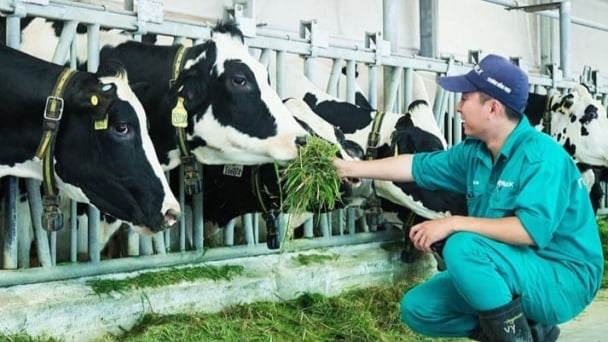
(VAN) According to Tong Xuan Chinh, Deputy Director of the Department of Livestock Production and Animal Health, Vietnam’s dairy cattle industry must overcome seven major challenges to achieve sustainable development.
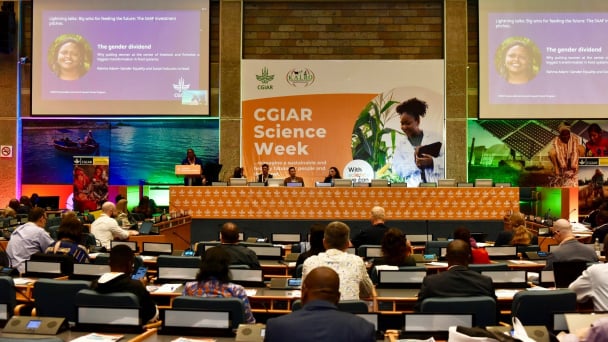
(VAN) The CGIAR’s Sustainable Animal and Aquatic Foods (SAAF) program represents a new approach that emphasizes the transformation of food systems toward sustainability.
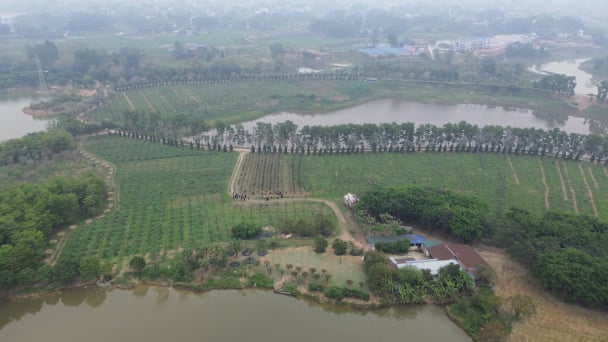
(VAN) Scientists assume that industrial agriculture has been 'outdated.' As a result, a comprehensive overhaul or a revolution in the direction of embracing ecological agriculture is needed.
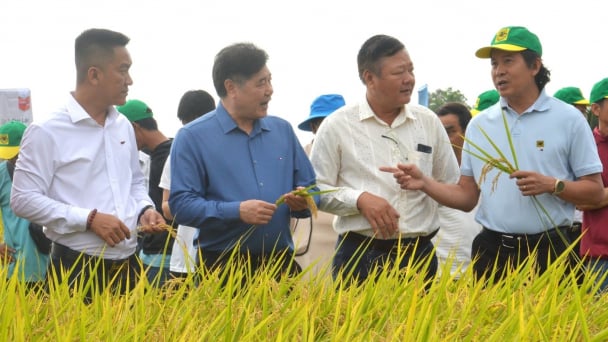
(VAN) The results from pilot fields are catalyzing the expansion of the One million hectares of high-quality, low-emission rice project in Kien Giang.
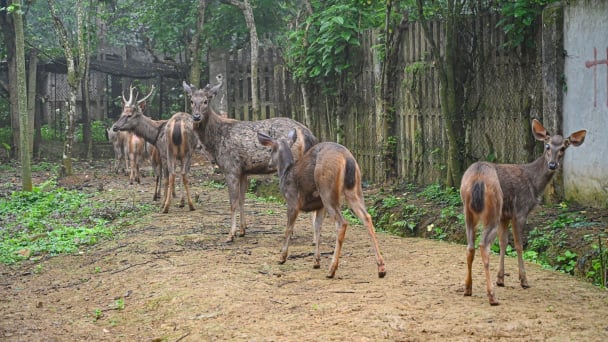
(VAN) On the morning of April 11, Cuc Phuong National Park received 18 individuals of endangered and rare wild animals from Da Nang city.
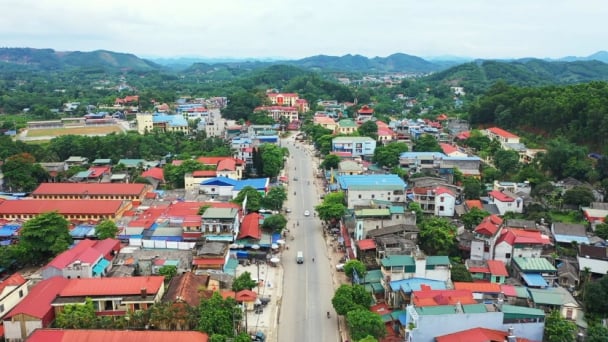
(VAN) FAO supports Vietnam in enhancing survey sampling techniques for the 2025 nationwide agricultural and rural census.

(VAN) By participating in the green transition, manufacturers become an indispensable part of the circular economy, contributing to resource optimization and environmental protection.